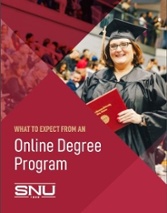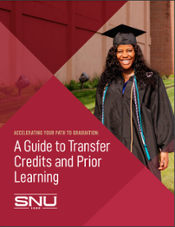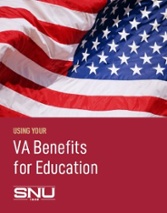
Whether you’re looking to advance your career, increase your earnings, or complete your degree after an extended gap, higher education provides an avenue for achieving your next major milestone.
As an adult, you can attain industry certifications, expand your network and ultimately build a successful and fulfilling future for yourself. If you’re a prospective job seekers, your degree will set you apart from other candidates in an increasingly competitive job market.
In fact, in 2019, the employment rate among high school graduates with no college was 74%. The same report found that employment among 25- to 34-year-olds with at least a bachelor’s degree was 87%. Not only are higher degrees marketable; they’re also profitable. The typical associate’s degree holder earns an average of $49,000 at career peak, while a bachelor’s degree holder will earn an average of $68,000 at career peak.
But what is the best age to enroll in adult education? We’ll break it down for you, decade by decade.
When’s the Right Time?
Studies show that 38% of undergraduate students are older than 25, and 26% are raising children. More and more adults are returning to school to reap the personal and professional benefits. So although you may envision returning to school as a larger-than-life adult shoved into a tiny desk and surrounded by recent high school grads off on their own for the first time, the truth is that classroom settings are more diverse than ever before, including in age demographics.
Higher ed institutions are prepared to meet the growing needs of adult learners. In 2017, 58% of undergrad students worked while enrolled in college. Coursework is more flexible now than ever before. Adult education programs offer classes at night, on weekends or online so that you can take your learning wherever you go while keeping up with busy work schedules and home life.
Every age offers a unique opportunity to flourish academically and challenge yourself professionally while rising to the challenges of your everyday life. It's never too late to get started.
Returning to School in Your 20s
There are a few reasons why going back to college in your 20s might be the best move for you. Now that you’ve had some experience in the workforce, you’re better positioned to choose a career that suits your skills and interests best. Returning to school offers an opportunity to refine those skills and improve your marketability.
Your early professional years offer the most flexibility. Your job search is broad, which increases your hiring prospects. Perhaps you’re willing to relocate or commute. Maybe you can work longer hours. You might not yet have the family responsibilities of someone returning to school in their 30s, 40s, or 50s. The freedom of your 20s opens the doors to a variety of adult education programs.
Keep in mind that although grad school expands your career prospects, it also comes with a hefty price tag. Learn about scholarship opportunities before you commit to a degree program so that you can graduate debt-free or with limited debt. First, complete your FAFSA form and research financial aid and need-based scholarships your college offers. Second, for prospective students hoping to level up in their career, find out more about education reimbursement plans that may be available through your employer. This is an especially useful route if earning a certificate or degree will directly benefit you in your current role or next step. Inquire about these opportunities in writing.
Before submitting the inquiry, research your company’s tuition reimbursement policy to learn whether the company has partnered with colleges to provide free courses, find out what tax breaks may be available and read about any tuition assistance contingencies that may be in place (e.g., renewal of assistance each semester, academic performance expectations).
You may ask questions such as:
- How long must an employee work for the company before they can participate in a tuition assistance benefits program?
- In the case that an employee leaves the company before their degree is completed, do they need to reimburse the company?
- Are employees required to stay with the company for a fixed period of time after program completion?
Returning to School in Your 30s
Once you’ve hit your 30s, you’re probably feeling a bit more settled in life. Perhaps you’ve set down roots and purchased a home. Maybe you have a family of your own. You’ve spent the last decade of your life in the professional world, and they’ve been formative years as you learned the ropes of your industry; you may have even climbed the first few rungs of the corporate ladder.
But it is normal to hit a lull as a professional in your 30s and begin to reassess whether your current work-life balance offers the kind of dynamics you can live with long-term. If you’ve moved to a new city, you’ve also experienced what a game changer location can be as you settled into the career path that’s right for you. At this stage in life, you may also gain a sense of clarity about what it is you want to do with your life and which direction you’re headed over the next 5-10 years.
Now is the perfect time to pursue higher education as part of a career or salary advancement plan or to build a portfolio of credentials, including industry certifications. Look for programs that offer retroactive credit based on real-life skills and experience. Explore degree programs that will earn you more money and expand your network.
Women in their 30s in particular have been inundated with outdated mantras about “doing it all” when it comes to balancing a family, career and education. Higher education institutions today recognize the real challenges women face while paving a clear path forward. As an adult returning to school in your 30s, focus on programs that offer online, night and weekend classes. Search for programs that offer accelerated tracks, including condensed classes and program schedules, as well as transitional and career counseling. You don’t have to iron out every minute detail before enrollment. Make the most of your higher ed experience by taking advantage of support and enrollment counselors.
Returning to School in Your 40s
By your 40s, you may be juggling a full-time career and family. Your schedule is packed, and it may feel overwhelming to set aside time to pursue personal or professional interests. As your life priorities change, so do your career goals, either or both of which may lead you to consider pursuing an adult education.
But how can you balance current demands on your time with the kind of commitment required to earn your degree? The key is to set realistic goals for yourself. Luckily, degree programs for adults are breaking down as many barriers as possible. You can choose to conduct your coursework the traditional way, in the classroom, or complete your degree online to give yourself added flexibility and control.
At this stage, you’re more motivated to take ownership of your education. Students returning to school as adults are likely feeling the same way. Adult students are invested in learning and committed to gaining new skills, and they may have an easier time asking questions because they are less intimidated by professors than their younger counterparts.
Returning to School in Your 50s
Now that you feel settled in your career and day-to-day life, you may consider going back to school to finish a degree you never completed. Perhaps you started a family young, took on a demanding job, or even enlisted in the military. You now have the chance to put yourself first and pursue lifelong dreams of your own.
Adults students in their 50s may consider going back to school because their particular field demands it. Professionals in business and technology industries who continue their studies as adults improve their aptitude as it relates to industry trends.
Returning to School in Your 60s +
The U.S. Census Bureau reports that nearly one in four Americans ages 65-74 without disabilities is currently participating in the labor force. Concerns about retirement preoccupy many American adults age 60 and older as Social Security dries up and retirement costs balloon. Education provides an opportunity to build a financial safety net as you wind down your last decade in the workforce so you can enter retirement with a sense of peace and security.
Adults in their 60s can prioritize long-held passions and interests inside the classroom and online. They can take their real-world knowledge and apply critical thinking to learn new skills, challenge opinions and ask pressing questions. There’s no expiration date on the value of an education, and returning to school is a chance to foster a sense of accomplishment and fulfillment while the pace of life begins to slow and the stresses of a demanding career and busy family life ease.
Whatever age you decide to go back to school is the perfect age to grow and challenge yourself. There is a world of opportunity that awaits you.
To learn more about financing your education as an adult student, check out “The Complete Guide to Financial Aid.”











